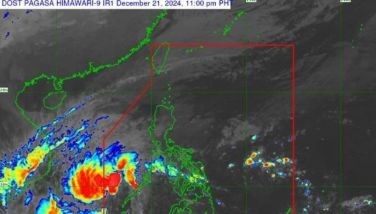Man gets life for planting marijuana
August 27, 2005 | 12:00am
A man was sentenced to life imprisonment with a fine of P500,000 for cultivating a marijuana plantation in the mountain barangay of Adlaon.
"The prosecution has established by competent evidence the guilt of the accused beyond reasonable doubt," said Regional Trial Court presiding judge Soliver Peras in his 25-page decision finding Zosimo Turno guilty of the crime.
On the morning of March 14, 2002, elements of the Talamban Police Station, headed by station commander Aristides Macatangay, raided a marijuana plantation in sitio Cubkawa. During the raid, police arrested Turno and confiscated 221 stalks of fully grown marijuana plants, 280 pieces or 23.06 grams of young marijuana plants, and 10 pieces or 545.45 grams of freshly uprooted marijuana stalks believed owned by Turno.
During the trial, the prosecution presented SPO1 Neri Cahimat who testified that on March 13, 2002 they received advisory that they were going to inspect a reported marijuana plantation in sitio Cubkawa. Cahimat said that when they arrived at the place, they saw fully grown marijuana plants and when they started uprooting them, they saw Turno coming.
When they asked Turno who owned the plantation, the latter answered he has no idea, prompting them to arrest him.
Another prosecution witness, PO3 Ricardo Escobido, testified that he was with the team that raided the marijuana plantation. Escobido added that Turno's neighbors identified him as the owner of the lot, although the suspect denied this.
Adlaon barangay captain Nieves Nara, a witness for the prosecution, testified before the court that Turno is a resident of her barangay and that he owns a farm lot that he has planted with vegetables and flowers. Nara added that she has no idea that Turno cultivated a marijuana plantation.
Peras said that even if the defense had raised the issue of the warrantless search during the trial, it would still be "denied since there was proper justification for the admissibility of these evidence falling under the category of evidence in plain view."
And even if the accused maintained that the prosecution had no proof of his alleged ownership of the lot, the court said that "proof of ownership of the land is immaterial or irrelevant in order for the prosecution's cause to prosper." What was essential, according to Peras, was that the "prosecution was able to prove that the accused is cultivating the marijuana plants."
Peras found the testimonies of the arresting officers as credible.
The defense also failed to present the people whom the accused said he was working with. Turno testified that he worked for a certain Mario who owned the field. However, he could not say the family name of Mario, thus, the court believed this person to be "fictitious." - Liv G. Campo
"The prosecution has established by competent evidence the guilt of the accused beyond reasonable doubt," said Regional Trial Court presiding judge Soliver Peras in his 25-page decision finding Zosimo Turno guilty of the crime.
On the morning of March 14, 2002, elements of the Talamban Police Station, headed by station commander Aristides Macatangay, raided a marijuana plantation in sitio Cubkawa. During the raid, police arrested Turno and confiscated 221 stalks of fully grown marijuana plants, 280 pieces or 23.06 grams of young marijuana plants, and 10 pieces or 545.45 grams of freshly uprooted marijuana stalks believed owned by Turno.
During the trial, the prosecution presented SPO1 Neri Cahimat who testified that on March 13, 2002 they received advisory that they were going to inspect a reported marijuana plantation in sitio Cubkawa. Cahimat said that when they arrived at the place, they saw fully grown marijuana plants and when they started uprooting them, they saw Turno coming.
When they asked Turno who owned the plantation, the latter answered he has no idea, prompting them to arrest him.
Another prosecution witness, PO3 Ricardo Escobido, testified that he was with the team that raided the marijuana plantation. Escobido added that Turno's neighbors identified him as the owner of the lot, although the suspect denied this.
Adlaon barangay captain Nieves Nara, a witness for the prosecution, testified before the court that Turno is a resident of her barangay and that he owns a farm lot that he has planted with vegetables and flowers. Nara added that she has no idea that Turno cultivated a marijuana plantation.
Peras said that even if the defense had raised the issue of the warrantless search during the trial, it would still be "denied since there was proper justification for the admissibility of these evidence falling under the category of evidence in plain view."
And even if the accused maintained that the prosecution had no proof of his alleged ownership of the lot, the court said that "proof of ownership of the land is immaterial or irrelevant in order for the prosecution's cause to prosper." What was essential, according to Peras, was that the "prosecution was able to prove that the accused is cultivating the marijuana plants."
Peras found the testimonies of the arresting officers as credible.
The defense also failed to present the people whom the accused said he was working with. Turno testified that he worked for a certain Mario who owned the field. However, he could not say the family name of Mario, thus, the court believed this person to be "fictitious." - Liv G. Campo
BrandSpace Articles
<
>
- Latest
- Trending
Trending
Latest
Trending
Latest
Recommended






















